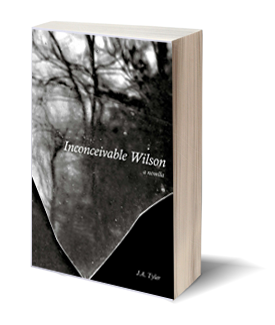Inconceivable WilsonBy J.A. Tyler |
 |
|---|
Reviewed by Ethan Joella
To classify J.A. Tyler’s Inconceivable Wilson as a novella is as about as effective as labeling Moby Dick a fish tale: Tyler’s book transcends cataloging, and by this surpassing of form delivers an unrestricted, daring experience of language and discovery, successful as a collage of fits, containing poetry, literary confession, and stream of consciousness narrative.
Tyler does here what most writers lack the courage to do: he goes with what he feels, without losing sleep over the resulting form. Inconceivable Wilson is comprised of a series of linked pieces that create an appealing whole with writing reminiscent of Nathalie Sarraute or Alain Robbe-Grillet. Any devotee of The New Novel movement would salute this piece: Philip Stevick, the writer who famously studied anti-stories, might identify this work as “against event” or “against analysis,” but the beauty of Inconceivable Wilson is the journey of verbal skill it takes you on, with the reader cherishing each passage rather than worrying about what happens next.
An astonishing aspect of Tyler’s work is his deft use of poetic repetition, which lends a lovely oral quality to Inconceivable Wilson:
Kiss. We kiss. We have kissed with her and that dress sheltering a carved
body. We have kissed. Kiss. We kiss. Go. I go. Please forgive the way I
look, before I became so much less of me.
The going theme repeats throughout the work in with succinct lines such as “My eyes today are gone” and “Go, I go. I am gone" examining what is fleeting in life and what returns. Darkness receives an overlapping treatment in a concentrated, appealing format: “Darkness is absolute. Darkness is.” A few pages later, Tyler returns to the dark with the line, “I sit in the darkness here that might be day and might be mid-July or the barren dredge of winter.” The tranquil, masterful way Tyler returns to his themes reminds one of mellow ocean waves that keep returning, a subtle artistry that impresses and reminds: Thoughts return. Images return. We deal with life again and again in different ways and through different perspectives.
The prose that Tyler employs is honest and moving to the reader, and it has a quality similar to confessional poetry—I call it confessional prose in this case. Lines such as “They are breaking and I am no hero” and “I did not expect to find this” show the self-reflection and honesty of the narrator. A way of laying out flaws and wounds for the reader to see and celebrate. The confessional aspect of this prose is not self-pitying or self-effacing. Rather, it is just expressive of self and whatever truth that self holds. Tyler captures his readers with truths such as “I am wholeheartedly sorry for the shape of my thoughts, they have gone south of me.”
A stream-of-consciousness narrative fills in the blanks of Inconceivable Wilson, helpful to the reader who wants to set up camp in the piece and establish some sense of the piece’s people and landscape: “A woman in the night, it is always night, she eats my words: stay and consume,” or,“Undone, come undone. I am undone. Undo this, revise, redraft, go back.” Here, stream of consciousness provides an anchor to the story, an establishment of certainty by elaborating on place and contributing a better sense of the people and scenery in the book.
Tyler masterfully concludes Inconceivable Wilson as pleasantly as it was begun, continually pulling in the reader by providing a healthy variety of forms. In keeping with works of The New Novel, Inconceivable Wilson lends itself to going back to the work and experiencing it again and again for additional study and reinterpretation. As Tyler says: “Go. Go,” and then go back, starting again at the beginning.
